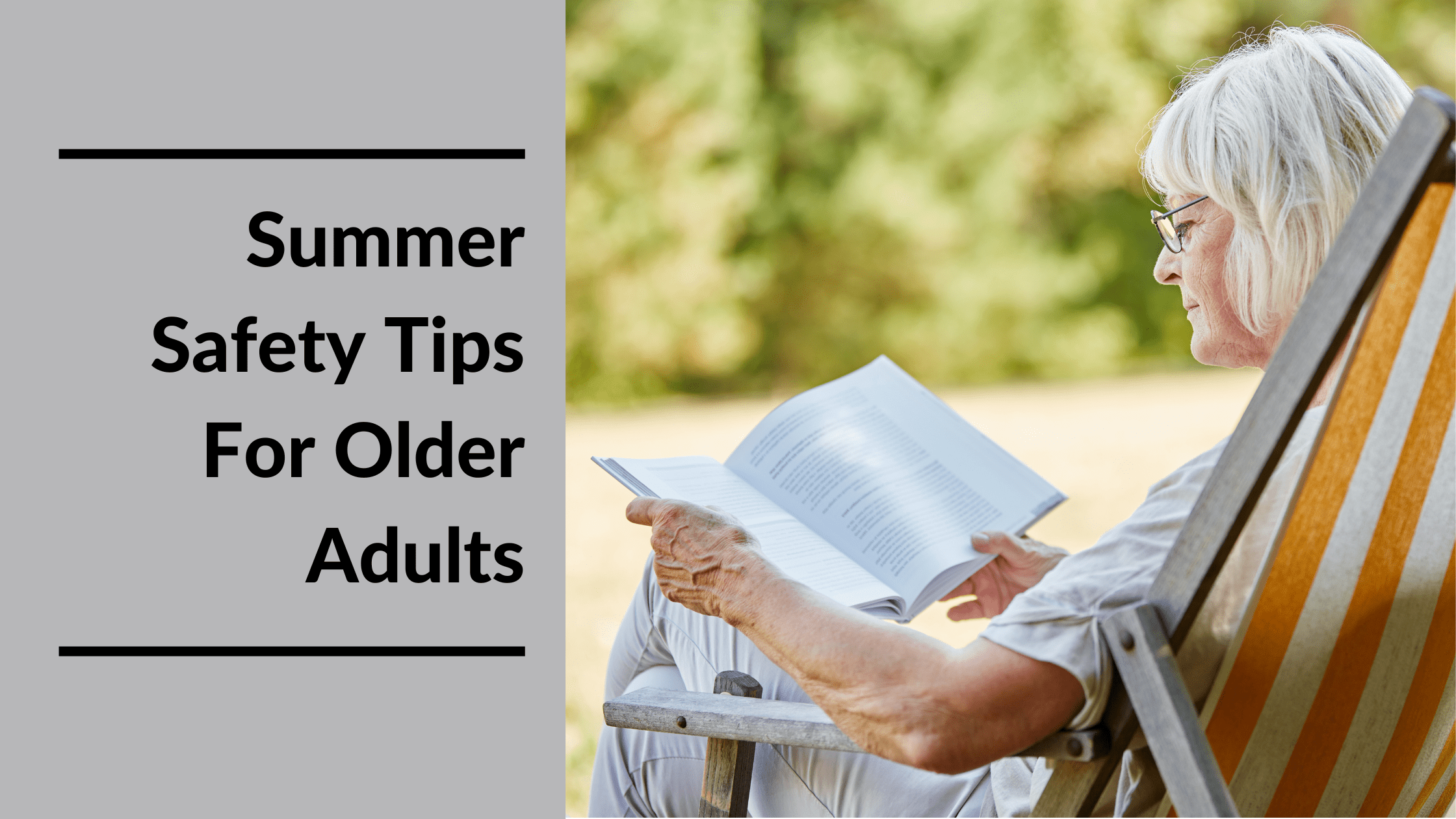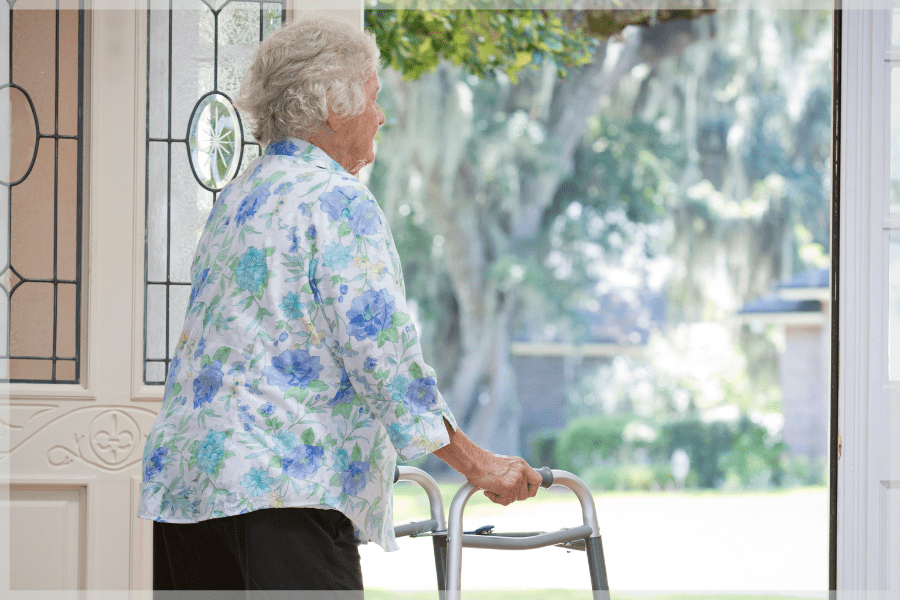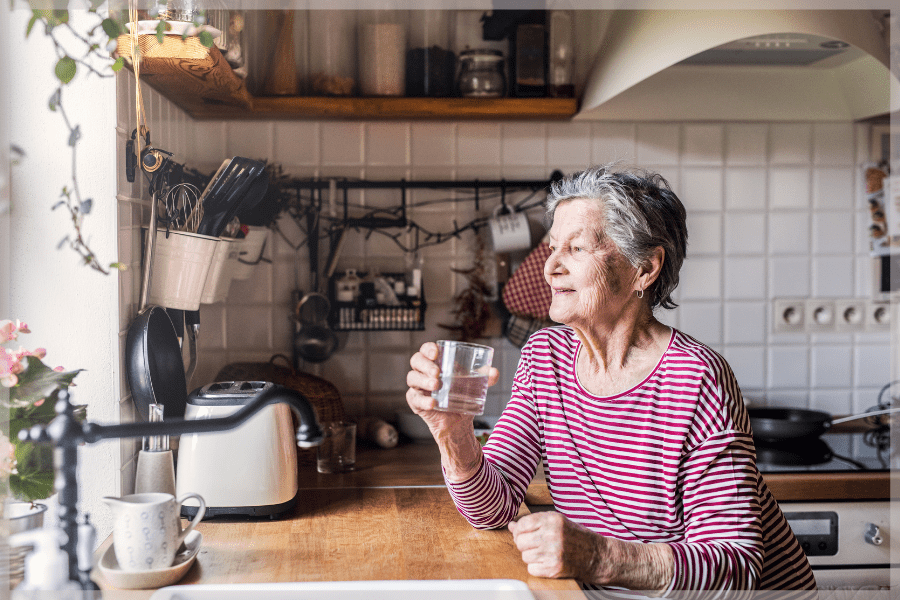
To keep you safe, healthy, and protected, here are some summer safety tips for older adults to ensure you get the most out of this season.
Updated February 15, 2023
Summer Safety Tips For Older Adults
Summer means better weather and more outdoor opportunities, regardless of age. Not only that, but extended daylight hours mean more time for fun after months of short winter days.
Getting active and making the most of what summertime offers is excellent, but some seniors may be more heat sensitive. Or, they may need to take a little extra care during their time outdoors. So, to keep you safe, healthy, and protected, here are some summer safety tips for older adults to ensure you get the most out of this season.
Helpful Summer Safety Tips For Older Adults
1. Take Steps To Prevent Falls
Without a doubt, falls are the surest way to put a damper on summer activities. Not only can it affect your mobility, but it can open the door for future complications. So, consider preventive summer safety tips such as:
- Wearing close-toed shoes, not flip-flops and sandals
- Using a walking stick or cane to make getting around less strenuous
- Getting enough sleep so you can stay alert and aware of your surroundings
- Being aware of wet spots around pools, fountains, water parks, gyms, and bathrooms
- Watching for incline changes, holes, or other places where you can easily trip while outside
- Clearing debris or other obstacles from the yard, driveway, and walkways, especially after summer storms
- Staying indoors when feeling tired or weak and drinking water to avoid dizziness and confusion caused by dehydration

2. Stay Hydrated
The rule of thumb (and one of the most important summer safety tips) is to drink 6 to 8 glasses of water daily. However, it would be best if you doubled that during the summer since you most likely sweat more and engage in more physical activity than at other times of the year.
Your body uses more energy when it is hot outside, so you need to give your body what it needs to continue to function at 100%. So educate yourself about the importance of drinking enough water and easy ways to stay hydrated such as:
- Use a reusable water bottle: It’s more environmentally friendly than continuously purchasing bottled water and will keep your drink colder for longer.
- Keep a big batch of flavored water in your fridge: Cucumber water hits the spot during the summer, and the cucumbers have the added advantage of hydrating you even more. In addition, they can lead to smoother, brighter, and healthier skin.
- Avoid coffee and caffeinated beverages that cause frequent bathroom trips: While coffee or tea won’t necessarily dehydrate you, excessive urination will.
- Avoid sports drinks: They’re a good source of electrolytes, but the sugar they contain can negate the benefits of drinking these types of beverages. It’s best to stick with water.
3. Protect Your Skin
Sun protection is among the most critical summer safety tips because seniors are especially susceptible to the harmful effects of UV rays. A few ways older adults can protect their skin include:
- Wear facial moisturizers with a high SPF:
Wear sunblock on any skin that will be or has the potential to face exposure. Apply 30 minutes before leaving the house and periodically as you can. - Stay in shaded areas as much as possible: Not only will it protect your skin better, but it will also help prevent overheating.
- Check your prescriptions: Some medications cause sun sensitivity, which can lead the skin to become quickly burned. If you take medicine, review the side effects to see how it will make your skin interact with the sun.
4. Learn the Signs of Heat-Related Illness
Recognizing the symptoms of common heat-related illnesses (and how to react) are essential summer safety tips for people of every age. Learn the signs of dehydration, heatstroke, and heat exhaustion, so you know what to look for and manage an emergency.

Dehydration
The signs of dehydration include:
- Shock
- Fever
- Seizure
- Dry skin
- Dry mouth
- Headache
- Dizziness
- Yellow urine
- Intense thirst
- Rapid heart rate
- Inability to shed tears
- Feeling tired or lethargic
- A drop in blood pressure
- Loss of elasticity in the skin
While dangerous, dehydration is relatively simple to treat as the focus is on replenishing your fluid intake. So drink lots of water, clear broths, ice cubes, or sports drinks. For more severe cases, intravenous fluids may be necessary. Avoid coffee, tea, soda, juice, and other beverages that can worsen the effects of dehydration.
Heat Stroke
On the other hand, the signs of heat stroke include:
- Seizures
- Fainting
- Lack of sweating
- Pulsing headache
- Nausea and vomiting
- Dizziness and lightheartedness
- Muscle weakness and cramping
- Breathing becomes shallow and quick
- Confusion, disorientation, or staggering
- Fluttering heartbeat (can feel sharp or weak)
- Skin appears red and feels hot and dry to the touch
If these signs appear, immediately get a temperature reading. For temperatures of 104°F or higher, call 911 and get medical help immediately. Heatstroke is treated by quickly (but safely) lowering the body’s core temperature.
First, the doctor will give you an ice bath, use evaporation cooling techniques, wrap your body in a cooling blanket, or use ice packs on your groin, neck, back, and armpits. Then, they may also give you muscle relaxers to stop any shivering that may interfere with treatment.
Heat Exhaustion
Heat exhaustion can arise from two causes:
- Dehydration: These symptoms include insatiable thirst, weakness, headaches, or fainting.
- Salt depletion: Symptoms include nausea, vomiting, cramping muscles, and dizziness.
Heat exhaustion can quickly lead to heat stroke if not correctly treated, so watch for signs of heat exhaustion, which include:
- Pale skin
- Fainting
- Fatigue
- Dizziness
- Headache
- Confusion
- Excessive sweating
- Nausea, vomiting, diarrhea
- Yellow or dark-colored urine
- Rapid or fluttering heartbeat
- Muscle cramps, specifically in the abdomen
Treatment for heat exhaustion is simple:
- Take a cold shower or bath
- Drink plenty of water or electrolytes to replenish salts
- Remove any clothing that isn’t needed or clings to the body
- Use fans, ice, or cold towels to bring the body’s temperature back to normal
Summer Safety Tips And More From MeetCaregivers
Summer is an active season for people of every age. Still, seniors must be mindful of age-related changes that limit their ability to tolerate heat and sun exposure. Summer safety tips like these can help older adults stay safe and comfortable:
- Take preventative steps to avoid falls
- Stay hydrated
- Protect your skin
- Learn the signs of heat-related illnesses
MeetCaregivers helps seniors stay safe at home year-round. If you need an extra pair of eyes or your loved one needs a helping hand around the house, we can help.
Our professional caregivers can assist with your needs, including companionship, personal care, transportation assistance, and more. Call 1 (888) 541-1136 for more information. Or get started and find a caregiver today.
Visit our Blog for more resources and guides for aging in place, caregiving, and more.
- Ansorge, R. (n.d.). Heat Exhaustion. Heat Exhaustion: Symptoms, Causes, Treatment, Prevention. Retrieved February 15, 2023, from https://www.webmd.com/fitness-exercise/heat-exhaustion. Reviewed by Jabeen Begum, MD on December 06, 2022. Updated October 13, 2022
- Bouchez, C. (n.d.). Sun-Sensitizing Drugs. Retrieved August 19, 2019, from https://www.webmd.com/skin-problems-and-treatments/sun-sensitizing-drugs. Medically reviewed by Stephanie S. Gardner, MD, on April 26, 2022
- Crysta, P. (2017, December 17). Dehydration: Symptoms, causes, and treatments. Dehydrated skin: Symptoms, causes, treatment, and more. Retrieved August 19, 2019, from https://www.medicalnewstoday.com/articles/153363.php. Medically reviewed by Cynthia Cobb, DNP, APRN on January 26, 2021. Updated December 22, 2020
- Mayo Clinic Staff. (2022, June 25). Heatstroke. Heatstroke – Diagnosis and treatment – Mayo Clinic. Retrieved August 19, 2019, from https://www.mayoclinic.org/diseases-conditions/heat-stroke/diagnosis-treatment/drc-20353587
- Oliver, D. (2015, June 23). 3 Reasons Why Cucumber Is Your Skin’s New Best Friend. 3 Reasons Why Cucumber Is Your Skin’s New Best Friend | HuffPost Life. Retrieved August 19, 2019, from https://www.huffpost.com/entry/cucumber-skin-benefits_n_7645976. Updated December 6, 2017
- Schaefer, A. (2015, March 23). Gatorade: Is it good for you? Gatorade: Is It Good for You? Retrieved August 19, 2019, from https://www.healthline.com/health/food-nutrition/is-gatorade-bad-for-you#takeaway. Medically reviewed by Daniel Bubnis, MS, NASM-CPT, NASM-CPT, NASE Level II-CSS, Fitness. Updated October 3, 2018
- Zeratsky, K. (n.d.). The myth about caffeine and dehydration. Caffeine: Is it dehydrating or not? – Mayo Clinic. Retrieved August 19, 2019, from https://www.mayoclinic.org/healthy-lifestyle/nutrition-and-healthy-eating/expert-answers/caffeinated-drinks/faq-20057965. Updated January 12, 2023
